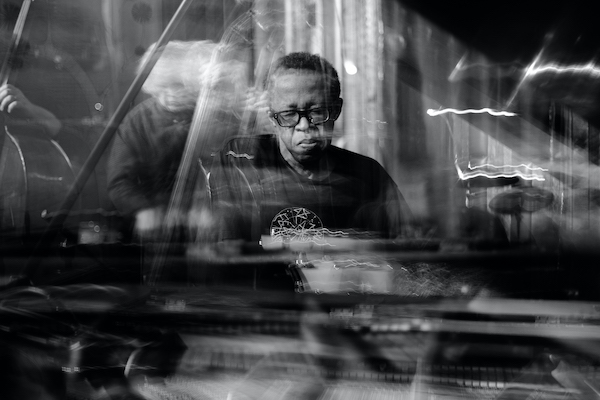Jan 13, 2026 2:09 PM
More Trump-Kennedy Center Cancellations
The fallout from the renaming of the John F. Kennedy Center for the Performing Arts to include President Donald…

The Tao Forms label recently issued its inaugural release, Matthew Shipp’s The Piano Equation.
(Photo: Anna Yatskevich)Pianist Matthew Shipp hasn’t been playing with anyone recently. Most musicians haven’t been, at least not in the way that we’re all accustomed to. But in some ways, his latest solo endeavor—The Piano Equation, which came out late in May and ranks as the first release on drummer Whit Dickey’s Tao Forms label—is fitting. It’s a weird time filled with isolation and tension, spurring on whatever fissures in American society already existed.
Listeners, though, might benefit from the solemnity of a solo piano album, even if Shipp doesn’t necessarily hue toward neat, straightahead work. There’s a bit of off-kilter Monk in portions of Shipp’s inflection, but also interstellar grace and idiomatic systems of organization that might not, at first blush, make sense to the uninitiated. Now, though, we all have time to sit and think. And The Piano Equation presents a perfect opportunity to pore over music derived from Shipp’s internal rhymes.
The pianist’s own voracious devouring of culture and media is on display on his Facebook page, veering from sports to music and politics. Following his chat with DownBeat last week—in which he maybe referenced Guy Debord’s The Society of the Spectacle—the pianist posted a story from the South China Morning Post that detailed former National Security Adviser John Bolton’s criticisms of President Donald Trump from an upcoming book.
When was the last time you read the South China Morning Post?
The following has been edited for length and clarity.
I think your Facebook feed’s known for being super political and engaged, and probably serves as a news source for some people. With the volume of stuff that you’re going through, how much of your day is spent just consuming news?
I’ve been consuming news my whole life, so I can do it quickly. I have a system down, where I can find a broad range of stuff really quickly. You know, most of my day is music, in some way—whether it’s practicing or the business. I would say in the morning, there are hours of figuring out what happened overnight. Then, maybe a half hour in the afternoon, and then late at night, I finish reading and watch cable news.
It’s like anything that you’ve been doing for a long time, you just know exactly the sources to go. You get a system down. But I’m not going to spend all day, because I am a jazz musician. I have that to attend to. I mean, during this period, there’s nothing else you’re doing—you’re not watching sports.
Like a lot of Americans, I’m gonna guess that your attention vacillates between the pandemic and protests that emerged a few weeks ago after George Floyd was killed. So, there’s this dichotomy …
I mean, the protests are necessary. It’s a historic time. To be honest, I haven’t been involved with a bunch of protests, mainly because I’m turning 60—I haven’t had any health issues. But the protests are necessary. They’re spontaneous, they’re natural. It’s just the time.
The mask thing is a separate thing, you know. People should be wearing masks. It’s simple.
You’re writing, playing and improvising through all of this. So, have you noticed a change in how you’re relating to music?
No, my music is completely metaphysical. And the world of reality as we know it here on this planet—I truly use music to go to another place, another energy realm. I don’t know what to call it. It’s someplace deep inside of me. And it is not impacted by current events, whatsoever. It truly is an attempt to dwell in a world that is outside of space and time, outside of the particular realm of problems that we encounter.
The psychological space I enter into is a mystic one of somebody who is trying to transcend; the music is an attempt to do that.

Belá Fleck during an interview with Fredrika Whitfield on CNN.
Jan 13, 2026 2:09 PM
The fallout from the renaming of the John F. Kennedy Center for the Performing Arts to include President Donald…

Peplowski first came to prominence in legacy swing bands, including the final iteration of the Benny Goodman Orchestra, before beginning a solo career in the late 1980s.
Feb 3, 2026 12:10 AM
Ken Peplowski, a clarinetist and tenor saxophonist who straddled the worlds of traditional and modern jazz, died Feb. 2…

The success of Oregon’s first album, 1971’s Music Of Another Present Era, allowed Towner to establish a solo career.
Jan 19, 2026 5:02 PM
Ralph Towner, a guitarist and composer who blended multiple genres, including jazz — and throughout them all remained…

Rico’s Anti-Microbial Instrument Swab
Jan 19, 2026 2:48 PM
With this year’s NAMM Show right around the corner, we can look forward to plenty of new and innovative instruments…

Richie Beirach was particularly renowned for his approach to chromatic harmony, which he used to improvise reharmonizations of originals and standards.
Jan 27, 2026 11:19 AM
Richie Beirach, a pianist and composer who channeled a knowledge of modern classical music into his jazz practice,…